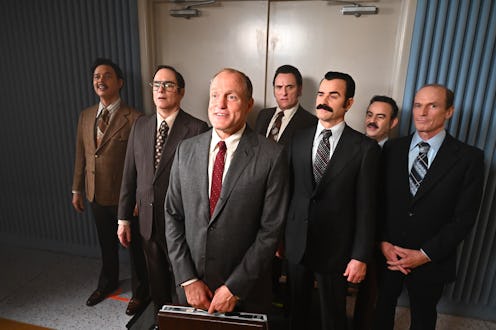TV & Movies
E. Howard Hunt Faced Tragedy After Orchestrating The Watergate Break-In
Woody Harrelson plays the former CIA agent in HBO’s White House Plumbers.

The title of HBO’s White House Plumbers refers to the clandestine unit former president Richard Nixon put together to plug information leaks. At the center of the five-part satirical drama series is the unlikely pair E. Howard Hunt (Woody Harrelson) and G. Gordon Liddy (Justin Theroux), who investigated a Pentagon leak before landing on the Committee to Re-Elect the President. Together, the men plotted several unbelievable covert ops — including bugging the Democratic National Committee offices at the Watergate complex. The botched scheme ultimately led to Nixon’s 1974 resignation, as well as jail time for Hunt and Liddy, in what became known as one of the greatest political scandals in American history.
A former CIA agent, Hunt’s career as a government intelligence officer took a downward turn following the disastrous invasion of Cuba’s Bay of Pigs in 1961. After he retired from the CIA in 1970, the native of Hamburg, New York, worked at a Washington, D.C., public relations firm, but he soon landed a job as a $100-a-day “security consultant” at the Nixon White House in 1971 where he was tasked with carrying out tasks of political warfare, culminating with the Watergate scandal the following year.
Along with Liddy, Hunt helped orchestrate two break-ins at the DNC’s Watergate offices in 1972. Though their men — including several Cuban Bay of Pigs veterans — were able to cleanly plant bugs and photograph documents on May 28, 1972, police apprehended them when they returned to the scene to remove the taps on June 17. One of the men had Hunt’s name and a White House telephone number in his address book, leading to his arrest and indictment on charges of burglary, wiretapping, and conspiracy.
While appearing before the judge who sentenced him, Hunt said he was “alone, nearly friendless, ridiculed, disgraced, [and] destroyed as a man.” Indeed, his wife, Dorothy, died in a December 1972 plane crash, he’d suffered a stroke, and his legal fees reportedly approached $1 million. By that time, he’d also grown disillusioned by the United States political system. “I am crushed by the failure of my government to protect me and my family as in the past it has always done for its clandestine agents,” Hunt told the Senate committee investigating the Watergate affair in 1973. “I cannot escape feeling that the country I have served for my entire life and which directed me to carry out the Watergate entry is punishing me for doing the very things it trained and directed me to do.”
The former Naval aviator served 33 months in prison and was freed just before his 60th birthday. Following his release, Hunt moved to Miami, where he met and married his second wife, Laura, and started a second family. He also used his experiences to author more than 70 novels, posthumously publishing his final book, American Spy: My Secret History in the C.I.A., Watergate and Beyond, shortly after he died of pneumonia in January 2007 at age 88. At the time of his death, Hunt was survived by his wife, six children, seven grandchildren, and three great-grandchildren.
This article was originally published on